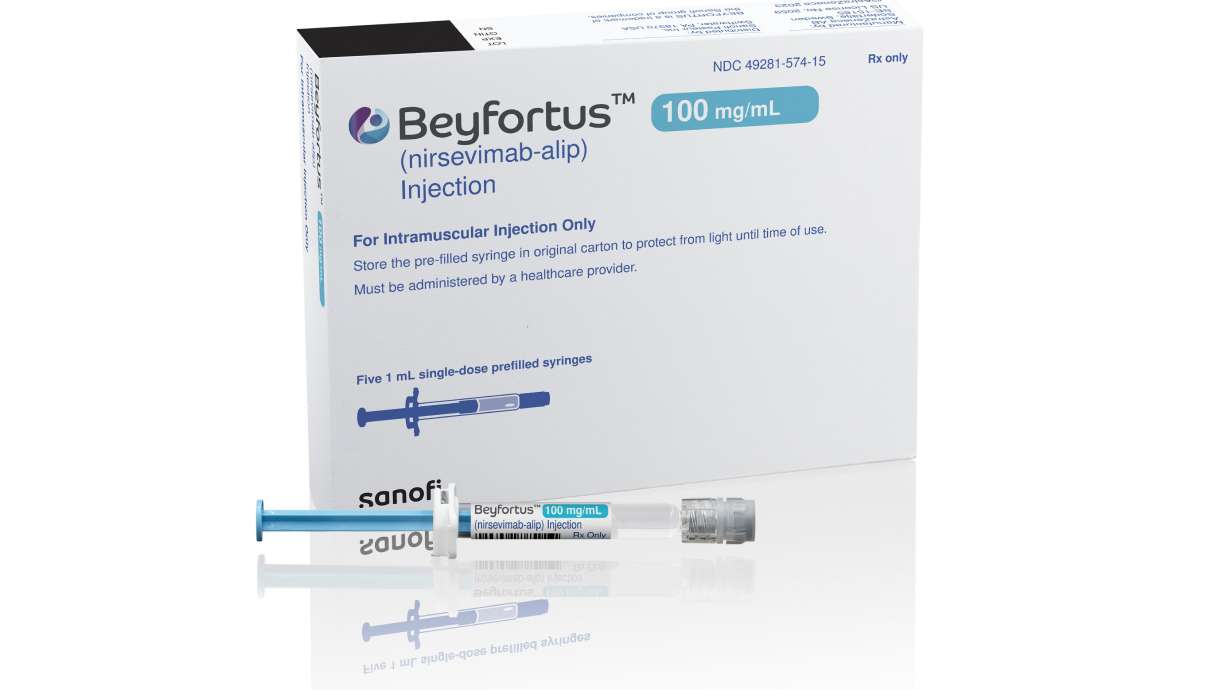Estimated read time: 4-5 minutes
This archived news story is available only for your personal, non-commercial use. Information in the story may be outdated or superseded by additional information. Reading or replaying the story in its archived form does not constitute a republication of the story.
SALT LAKE CITY — The first RSV immunization recommended for all infants under 8 months old is no longer expected to be available to everyone in that age group, thanks to limited supplies nationwide.
"Unfortunately, this shortage has put us in a difficult spot," said Whitney Buckel, an infectious diseases pharmacist that oversees antibiotic use for Intermountain Health, the region's largest health care system.
With the respiratory syncytial virus season expected to start in November, the plan had been to target every eligible patient "to prevent severe RSV disease in all infants that we see," Buckel said.
But the Centers for Disease Control and Prevention issued an advisory Monday about the impact of what the manufacturer of Beyfortus, the brand name for nirsevimab, called "unprecedented demand" for the RSV monoclonal prophylaxis.
The CDC said higher doses of the treatment, intended for infants weighing more than 11 pounds, should instead be prioritized for those at the highest risk for severe RSV disease because they're under 6 months old or have underlying conditions.
The shots were authorized earlier this year for all infants under 8 months old as well as for children 8 to 19 months old at increased risk for severe RSV, a leading cause of hospitalization among infants in the United States.
Buckel said the updated recommendations mean "if you're a parent and you have an older child, we're in a shortage situation and may not be able to provide it for your infant unless they are at highest risk."
Intermountain Health has already started giving the treatment to neonatal intensive care unit patients, she said, with the hope of offering it outside hospitals starting next month to babies under 11 pounds.
(If) you have an older child, we're in a shortage situation and may not be able to provide it for your infant unless they are at highest risk.
–Whitney Buckel, Intermountain Health
While the higher dose is "acutely on shortage," shipments of the lower dose are also being limited, she said. There is no RSV vaccine for older children, although shots are available for adults who are 32 to 36 weeks pregnant, or over 60 years old.
"We're really trying to promote the RSV vaccine in our pregnant women. I think the more that we can do that, the more that we'll have infants protected this year," Buckel said, since antibodies generated as a result of the vaccine are passed along to the fetus.
Otherwise, the only advice she can offer to parents whose children will no longer be able to get the RSV treatment are to take "everyday preventive measures," such as frequent hand washing, covering coughs and staying home when sick.
Such simple steps helped tamp down RSV during much of the COVID-19 pandemic, Buckel said. Last fall saw a surge in RSV and flu cases among children, filling up Intermountain Primary Children's Hospital and forcing the postponement of some scheduled surgeries.
Many parents had been excited about protecting their infants from RSV this year, Buckel said, acknowledging the shortage is a "big disappointment" for doctors because "they care so much about all their kids. It's really hard to have that conversation."
To know there's a way to prevent severe disease and not be able to use that treatment is disheartening.
–Dr. David Cope, family medicine doctor
Dr. David Cope, a family medicine doctor in Bountiful, is already having to decide which of his youngest patients can get the treatment.
"It is real and it is worrisome that there'll be babies that go unprotected simply because of lack of supply," Cope said. "It doesn't make sense to offer it (to parents) and then say their baby 'doesn't qualify,' so I just bring it up and offer it to those who fit the criteria."
That takes a toll, Cope said.
"It is difficult and worrisome to have a baby in clinic and know they can benefit from this preventative treatment, not be able to offer that treatment, and then worry and consternate that this infant will be stricken with RSV," he said.
Cope said he worries, "Will he or she be one of those that suffer from severe disease? To know there's a way to prevent severe disease and not be able to use that treatment is disheartening."










